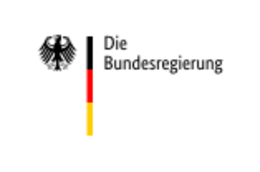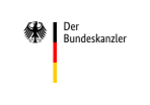Federal Government of Germany facts for kids
Quick facts for kids Federal Government of Germany |
|
|---|---|
| Bundesregierung | |
 
Logo (top) and Bundesadler (bottom) of the Federal Government
|
|
| Overview | |
| State | Germany |
| Leader | Federal Chancellor (Friedrich Merz) |
| Appointed by | Federal President (Frank-Walter Steinmeier) |
| Ministries | 16 Federal Ministries |
| Responsible to | Bundestag |
| Headquarters | Berlin, Germany |
The Federal Government (German: Bundesregierung) is the main group that runs Germany. It is in charge of making sure the country's laws are followed. This government is made up of the Federal Chancellor and several Federal Ministers.
The rules for how the government works are written in Germany's main rulebook, called the German Basic Law (Grundgesetz). These rules explain how the government is chosen, how it is appointed, and how it can be dismissed. The Chancellor and the Ministers can also be members of the German parliament, called the Bundestag.
There is also a larger group called the Federal Cabinet (Bundeskabinett). This includes the Federal Government members, plus other important people. For example, the head of the Chancellor's office and the head of the Federal Press Office are part of it. The word "cabinet" is often used to talk about different governments over time. For instance, the government led by Chancellor Angela Merkel was known as the Fourth Merkel cabinet.
Contents
How the Government is Chosen
The Chancellor is Germany's top leader. The government stays in power as long as the Chancellor does. The Chancellor's term starts when they are officially appointed. It ends when a new Bundestag (parliament) meets for the first time after an election.
Electing the Chancellor
The Chancellor is chosen by the Bundestag. The President of Germany suggests a candidate first. To be elected, the candidate needs more than half of all the votes from the Bundestag members. This is called the "Chancellor-majority."
If the Bundestag does not agree with the President's choice, they can try to elect someone else. They have 14 days to do this. During this time, different political parties in the Bundestag can suggest their own candidates. If someone gets the "Chancellor-majority," the President must appoint them.
If no one gets the majority after 14 days, there is one last vote on the 15th day. If a candidate gets the "Chancellor-majority" in this vote, the President must appoint them. If not, the President has two choices:
- Appoint the person who got the most votes, even if it's not a majority.
- Dissolve the Bundestag and call for a new election within 60 days.
Appointing the Ministers
After being elected by the Bundestag, the new Chancellor goes to Bellevue Palace. This is where the President lives. The President gives the Chancellor an official paper, and this is when the Chancellor officially starts their job.
Then, the Chancellor goes back to the Bundestag to take an oath. This is a promise to do their job well. After that, the Chancellor returns to Bellevue Palace. This time, they bring the people they want to be their cabinet ministers. The President then officially appoints these new ministers by giving them their own papers. Finally, the ministers go to the Bundestag to take their oaths. This completes the process of forming the new government.
When the Government's Term Ends
A Federal Government's term usually ends when a new Bundestag is formed after an election. At this point, the Chancellor no longer has the full support of the parliament. The President then officially dismisses the old government.
Caretaker Government
If a new Chancellor has not been chosen yet, the President can ask the old Chancellor to stay in charge temporarily. This is called an "acting Chancellor." The acting Chancellor can then ask the former ministers to also stay in their jobs temporarily. This group forms a "caretaker government."
A caretaker government can still do most of the things a regular government does. However, the acting Chancellor cannot ask the Bundestag for a vote of confidence. They also cannot suggest new ministers. Usually, if the acting Chancellor knows they won't be re-elected, they work closely with the person who is likely to become the next Chancellor.
When the Government's Term Ends Early
A Chancellor's term can end early if they pass away or resign. If this happens, the entire cabinet's term also ends right away. Just like with a regular end of term, the President asks the former Chancellor (or the Vice Chancellor if the Chancellor is not available) to continue as an acting government until a new Chancellor is elected.
Losing Parliament's Trust
The Chancellor's term can also end if they lose the trust of the Bundestag. However, the Bundestag can only remove a Chancellor if they immediately elect a new one at the same time. This is called a constructive vote of no confidence. This rule makes sure that Germany always has a leader and avoids a power vacuum. This system was put in place to prevent problems that happened in the past, where leaders were removed but no new one was chosen.
If the Chancellor asks for a simple vote of confidence and loses it, they are not forced out of office. Instead, the Chancellor can ask the President to dissolve the Bundestag. This leads to a new election within 60 days. This has happened a few times in Germany's history, for example, in 1972, 1983, and 2005. The President does not have to agree to dissolve the Bundestag.
If the Chancellor cannot do their job, the Vice Chancellor temporarily takes over. If the Chancellor's inability to work becomes permanent, the Bundestag could elect a new Chancellor using the constructive vote of no confidence.
How the Government Works
The Chancellor is responsible for leading the government. They decide the main direction of the country's policies. This is called Richtlinienkompetenz. Each government minister is free to manage their own department. They must work within the overall direction set by the Chancellor.
Chancellor's Power Over Ministers
The Chancellor can ask the President to dismiss a minister or appoint a new one at any time. The President's role in this is mostly a formality; they cannot refuse the Chancellor's request. The Chancellor also decides what each minister's job will be. They can appoint ministers who lead a specific department or ministers for special tasks without their own department. Sometimes, a Chancellor might even lead a department themselves, though this is not common.
The Chancellor's power to choose their government has some limits from the Basic Law. For example, the Chancellor must appoint a Minister of Defence, a Minister of Economic Affairs, and a Minister of Justice. The Chancellor cannot lead these departments themselves. This is because these ministers have special powers:
- The Minister of Defence is the commander-in-chief of the armed forces during peacetime.
- The Minister of Economic Affairs can stop certain decisions made by the Federal Cartel Office (which deals with fair competition).
- The Minister of Justice appoints and dismisses the Public Prosecutor General.
Cabinet Decisions
The Cabinet usually tries to make decisions together, with everyone agreeing. If they cannot agree on something, the issue might be put off, or the Chancellor might make the final decision. However, the Chancellor rarely uses this power. This is because German governments are often made up of several political parties working together. The Chancellor needs to work with all parties to keep the government strong.
The Vice Chancellor
The Chancellor must choose one of the government ministers to be the Vice Chancellor. The Vice Chancellor fills in for the Chancellor when they are away. In governments made of different parties, the Vice Chancellor is usually the most important minister from the second-largest party.
If the Chancellor passes away or cannot act as Chancellor after their term ends (until a new one is elected), the Vice Chancellor becomes the acting Chancellor. They then lead the government until a new Chancellor is elected by the Bundestag. This happened once in 1974 when Chancellor Willy Brandt resigned. Vice Chancellor Walter Scheel became acting Chancellor until Helmut Schmidt was elected.
Running the Government
The Chancellor is also in charge of the government's daily operations. These tasks are usually given to the Head of Staff of the Chancellery. This person is often also a minister for special affairs.
The government has rules for how it works internally. For example, at least half of the ministers, including the Chancellor (or Vice Chancellor), must be present for a meeting to be official. The government usually meets every Wednesday morning at the Chancellery in Berlin.
Federal Security Council
Germany has a Federal Security Council. This is a special government group led by the Chancellor. Its job is to make sure that weapons are only made, moved, and sold with the government's approval. This helps keep international peace. The council's meetings are secret. The government usually shares a report each year about arms exports. This report includes information on what weapons were approved for export and where they went.
Current Cabinet
The current German government is the 25th one. It started on May 6, 2025, when Friedrich Merz was elected Chancellor by the members of the 21st German Bundestag. It currently has 17 ministers.
| Order | Logo | Office | Portrait | Minister | Party | Taking office | |
|---|---|---|---|---|---|---|---|
| 1 |  |
Chancellor |  |
Friedrich Merz | CDU | 6 May 2025 | |
| 2 |  |
Vice Chancellor and Federal Minister of Finance |
 |
Lars Klingbeil | SPD | 6 May 2025 | |
| 3 |  |
Federal Minister of the Interior |  |
Alexander Dobrindt | CSU | 6 May 2025 | |
| 4 |  |
Federal Minister for Economic Affairs and Energy |  |
Katherina Reiche | CDU | 6 May 2025 | |
| 5 |  |
Federal Minister of Foreign Affairs |  |
Johann Wadephul | CDU | 6 May 2025 | |
| 6 |  |
Federal Minister of Justice and Consumer Protection |  |
Stefanie Hubig | SPD | 6 May 2025 | |
| 7 |  |
Federal Minister of Labour and Social Affairs |  |
Bärbel Bas | SPD | 6 May 2025 | |
| 8 |  |
Federal Minister of Defence |  |
Boris Pistorius | SPD | 19 January 2023 | |
| 9 |  |
Federal Minister of Agriculture, Food and Regional Identity |  |
Alois Rainer | CSU | 6 May 2025 | |
| 10 |  |
Federal Minister of Education, Family Affairs, Senior Citizens, Women and Youth |  |
Karin Prien | CDU | 6 May 2025 | |
| 11 |  |
Federal Minister of Health |  |
Nina Warken | CDU | 6 May 2025 | |
| 12 |  |
Federal Minister for Transport |  |
Patrick Schnieder | CDU | 6 May 2025 | |
| 13 |  |
Federal Minister for the Environment, Climate Action, Nature Conservation and Nuclear Safety |  |
Carsten Schneider | SPD | 6 May 2025 | |
| 14 |  |
Federal Minister of Research, Technology and Space |  |
Dorothee Bär | CSU | 6 May 2025 | |
| 15 |  |
Federal Minister for Economic Cooperation and Development |  |
Reem Alabali-Radovan | SPD | 6 May 2025 | |
| 16 |  |
Federal Minister for Housing, Urban Development and Building |  |
Verena Hubertz | SPD | 6 May 2025 | |
| 17 |  |
Federal Minister for Digital and State Modernisation |  |
Karsten Wildberger | Independent/CDU | 6 May 2025 | |
| 18 |  |
Federal Minister for Special Affairs
and Head of the Chancellery |
 |
Thorsten Frei | CDU | 6 May 2025 | |
| Party | Ministers | Percentage | |
|---|---|---|---|
| Christian Democratic Union | 7 | 41% | |
| Social Democratic Party | 7 | 41% | |
| Christian Social Union | 3 | 18% | |
| Total | 17 | 100% | |
See also
 In Spanish: Gobierno federal de Alemania para niños
In Spanish: Gobierno federal de Alemania para niños
- 2025 German federal election
- Federal Constitutional Court of Germany
- List of Federal Republic of Germany governments
- List of ministers of the Federal Republic of Germany
 | Madam C. J. Walker |
 | Janet Emerson Bashen |
 | Annie Turnbo Malone |
 | Maggie L. Walker |

